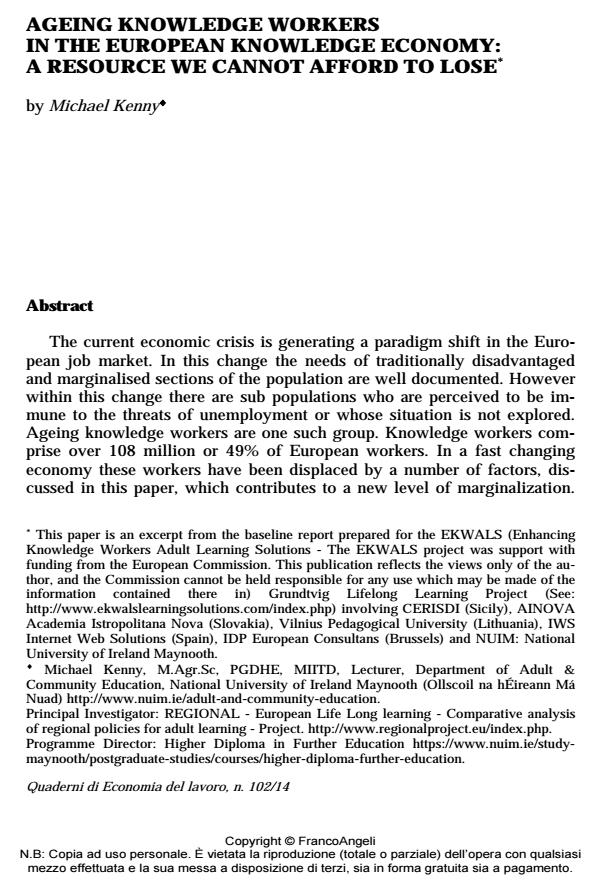Ageing knowledge workers in the european knowledge economy: a resource we cannot afford to lose
Journal title QUADERNI DI ECONOMIA DEL LAVORO
Author/s Michael Kenny
Publishing Year 2015 Issue 2014/102
Language Italian Pages 14 P. 29-42 File size 71 KB
DOI 10.3280/QUA2014-102003
DOI is like a bar code for intellectual property: to have more infomation
click here
Below, you can see the article first page
If you want to buy this article in PDF format, you can do it, following the instructions to buy download credits

FrancoAngeli is member of Publishers International Linking Association, Inc (PILA), a not-for-profit association which run the CrossRef service enabling links to and from online scholarly content.
The current economic crisis is generating a paradigm shift in the European job market. In this change the needs of traditionally disadvantaged and marginalised sections of the population are well documented. However within this change there are sub populations who are perceived to be immune to the threats of unemployment or whose situation is not explored. Ageing knowledge workers are one such group. Knowledge workers comprise over 108 million or 49% of European workers. In a fast changing economy these workers have been displaced by a number of factors, discussed in this paper, which contributes to a new level of marginalization. Further the skills and knowledge capacity of this population is being lost to the European economy and to active engagement at a more local level. With increasing longevity and pressures on welfare and pension systems the cost of retiring highly skilled knowledge workers while they are still active is being questioned. This paper seeks to map the factors impinging on the decisions that ageing knowledge workers make as they approach life transitions: unemployment, retirement, displacement. This paper suggests that, while further research and dialogue is needed, there is adequate understanding to recognise that the ageing knowledge workers are a resource that the modern world cannot afford, for both social and economic reasons, to lose.
- Hargreaves D. (2000). Knowledge management in the learning society. Paris: OECD. Houghton J. and Sheehan P. (2000). A Primer on the Knowledge Economy. National Innovation Summit, Melbourne.
- Hutsebaut M. (2009). Pension System Reforms and Trade Union Policies Overview of EUWestern Europe. The Risk Institute – Istituto Del Rischio – L’institut Du Risque.
- Kidd A. (1994). The Marks are on the Knowledge Worker. In: Proceedings of the SIGCHI conference on Human factors in computing systems. Boston, Massachusetts, United States.
- Mokyr J. (2002). The Gifts of Athena: Historical Origins of the Knowledge Economy. Princeton, NJ: Princeton University Press.
- OECD (Organisation For Economic Co-Operation And Development) (1996). The Knowledge-Based Economy. In; OCDE/GD(96)102. Paris, France.
- Pagani R., Pilatti L. and De Carvalho H. (2005). Characteristics and necessary Abilities to the knowledge worker. In 37th World Congress of the International Institute of Sociology, Stockholm.
- Stone L.O. (March, 2006). New Frontiers of Research on Retirement. Ottawa, Ontario: Statistics. Canada.
- Surinder B. (2009). Strengthening human capital for knowledge economy needs: an Indian perspective. Journal of Knowledge Management, 13(5).
- Yigitcanlan T., O’Connor K and Westerman C. (2008). The making of knowledge cities: Melbourne’s knowledge-based urban development experience.
- Brinkley I. (2006). Defining the Knowledge Economy. In: Knowledge Economy Programme Report. The Work Foundation: London.
- Brinkley I., Fauth R., Mahdon M. and Theodoropoulou S. (2009). Knowledge Workers and Knowledge Work - A Knowledge Economy Programme Report.
- CEC (2008). Demography Report 2008: Meeting Social Needs in an Ageing Society. Commonwealth Department of Education (2008). The knowledge Economy: What it is, where it comes from and what it means to Technology Education in Australian Schools. Ed. Commonwealth Department of Education.
- Crafts N. (2002). Productivity growth in the Industrial Revolution: a new growth accounting perspective. Proceedings.
- Drucker P. (1999). Managing the Non-profit Organization. Oxford: Butterworth-Heinemann.
- Drucker P. (1993). The Rise Of The Knowledge Society. Wilson Quarterly, 17(2).
Michael Kenny, Ageing knowledge workers in the european knowledge economy: a resource we cannot afford to lose in "QUADERNI DI ECONOMIA DEL LAVORO" 102/2014, pp 29-42, DOI: 10.3280/QUA2014-102003